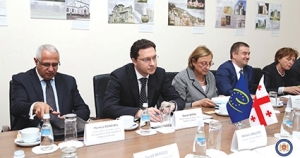CoE Dept. Secretary General Speaks out on Women and Minorities Situation in Georgia
Last week, Deputy Secretary General of the Council of Europe (CoE), Gabriella Battaini-Dragoni, together with Foreign Minister of Bulgaria and the current head of the Ministers Committee, Daniel Mitov, paid an official visit to Georgia. The visit was intended to present the Council of Europe’s action plan for Georgia for the period 2016-2019, adopted during Bulgaria’s Chairmanship of the Committee of Ministers of the CoE.
While in Tbilisi, esteemed guests met with the President Giorgi Margvelashvili, Prime Minister Giorgi Kvirikashvili, as well as Foreign Minister Mikheil Janelidze and Parliamentary Speaker Davit Usupashvili. GEORGIA TODAY was privileged to have an exclusive interview with the Dept. Secretary-General, whereupon she kindly provided us with her insights on various challenges that Georgia is facing on its way to consolidate its place among the European democracies.
The new CoE action plan for Georgia is more complex and ambitious than its predecessor. What are these new horizons you have set your sights on?
One sector where we want to be more ambitious and proactive is the acceleration of reform pace in the field of judiciary, because there are still important steps to make and we want to use these next years to reach almost the end of the reform process – and it really needs to be transparent, impartial and efficient.
Another important sector we want to see grow in the future is confidence-building measures. The CoE has this extraordinary opportunity to be able to go into Abkazia and South Ossetian regions – it’s an opportunity not so easily granted to everybody. And we want to do more because we realize how important it is to organize these CBM measures. We need to bring people together - sometimes in Abkhazia, sometimes in Georgia or South Ossetia, or even outside the country, as long as every side gets together to interact and have a conversation, we are happy. We’re already doing this, but in a limited manner- we need and plan to increase the scope. It’s very important that these people have the opportunity to talk to each other and not feel estranged and forgotten.
Yet another important field that we want to improve upon is the protection of human rights in Georgian society. Take women as an example. The issue of violence against women is a terrible problem throughout the Europe and sadly, Georgia is no exception.
What are the plans to improve the situation?
Firstly, we need to convince the authorities to work on the Istanbul Convention preventing and combating violence against women, and domestic violence. Georgia ratified it, but needs to do much more to stop women being victims of violence. Proper prosecution in such cases would prove invaluable as a preventive measure. The reason violence against women and children is so common is quite straightforward – because there is impunity and women are afraid to speak out. We would very much like to see this changed.
What about the minority groups?
Georgia acceded to the CoE in 1999. At the time they had to take on a number of commitments - one of those commitments was to ratify the Charter of Minority and Regional Languages. And while Georgia announced it would soon be ready to ratify, they still haven’t done so. We already made some attempts during the first action plan, but we haven’t gone very far.
Are any sanctions expected if Georgia doesn’t fulfil its obligations?
To be honest, the situation here is incredibly difficult because on one side we have minorities, yes, and Georgia really should prepare itself to ratify the Charter and put it into practice, yet at the same time there are other substantial language-related problems, too, which may affect that decision - for instance, in Abkhazia you have the problem of learning the Georgian language at schools. And I can understand that for the moment these issues might seem more urgent than others, so we are indulgent, but we can’t be indulgent forever, at one point something has really to be done, a strong message should be sent to all the different minorities that live in the country, so it’s very important that this commitment remains, and I do hope that after the elections the authorities will consider this as an important milestone.
What do you expect from the upcoming elections? How can they improve on the last?
The major issue is what’s happening now between the majority and opposition- debates on what kind of electoral law Georgia has to use, majoritarian or proportionary. As long as people can vote independently, without any interference, and the authorities don’t ask for the opinion of Venice Commission, we don’t enter that debate. But for us, what is very important is that after the elections, two or three groups of people, who are not sufficiently represented now, who do not really participate in elections, do so. The first category is women – do Georgians find it normal and acceptable that only 8 % of women are represented in their parliament? They could do so much better! It means that when they make up their list for elections, they have to include more women. Second point – young people voting for the first time. It is a very important experience – you have to be included, and you have to realize what a responsibility it is, which I don’t think is the case right now. They need to be motivated. Third group – minorities. They also need to participate more. The issue of the methodology is up to Georgian people to decide, but we, the Council of Europe, through our action plan want to promote and bolster the groups I mentioned.
Vazha Tavberidze












